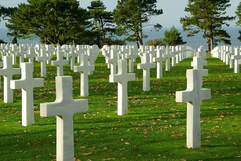 I write this on the anniversary of D-Day, the day where we remember the unimaginable and incalculable sacrifice of men who struggled, suffered, and died to turn the tide of World War II. Many of them never left the beaches and battlefields of Normandy and rest there to this day. Those who survived left a piece of themselves in that place, physically, mentally, spiritually. The sacrifice made should humble us. It should engender our respect and honor. We should recognize the cost paid to turn back powers that were engaged in the inhuman enterprise of death and destruction. It seems to me that the men who died in that battle, and all the soldiers, sailors, marines, and airmen who have died in any war at any time in human history (and what would that number be?), should always be honored. Whether they fought for a just cause, or simply for their siblings in arms; whether they sacrificed heroically or were scared out of their minds; whether they rested in peace or lived on, tormented by the experience, they are to be grieved, honored, remembered.
We should not romanticize the grim reality of D-Day or any other battle that leaves human beings, bloody and broken, in fields like waste. Nor should we use this as a model for shaping a world of “friend and foe,” “us and them,” like even our politicians do today. We should also not think that this remembrance is about bringing peace to the world. War is always brutal, violent, and death dealing. It never brings peace. Most often, it sets a stage for the next war after the end to all wars. When humans take up arms it is not the expression of our better selves. It is not acting in the image of God. John Howard Yoder, brilliant theologian, and peace activist, wrote, “The cross of Christ was God’s method of overcoming evil with good.” In Christ, God did not take up arms to defeat lesser powers in a test of power and will. God overcame the evil and death of the world by standing against it is peace. Christ loved both friend and enemy. Christ refused to take up the way of the world – the knife, sword, stone, gun, or bomb – and instead took up the cross. That’s what happens to people who will not hate “our” enemies or join our fight. Yoder says, “Jesus instructed his disciples, simply and clearly, not to resist evil and to love one’s enemy. (Matt. 5:39-45) He was not a foolish dreamer spinning out futile hopes for a better world, thinking that if we only keep smiling all will turn out all right. He knew full well the cost of such unlimited love.” Peace comes only when, like Christ, our swords are beaten into plowshares, guns are melted down, and humanity studies war no more. That begins when we love our enemies. Yoder continues: “No one created in God’s image and for whom Christ died can be for me and enemy, whose life I am willing to threaten or to take, unless I am devoted to something else – to a political theory, to a nation, to the defense of certain privileges, or to my own personal welfare – than I am to God’s cause.” Today we remember. We honor. We weep. Today, perhaps, we have the courage to love our enemies and ensure that no one ever dies on a far away beach again. In Christ’s name. Amen Pax Christi. Tim Olson – Lead Pastor Yoder’s quotes taken from Bread and Wine: Readings for Lent and Easter, published by Plough Publishing House, 2003. 392-394
0 Comments
Leave a Reply. |
Categories
All
Archives
July 2024
|


 RSS Feed
RSS Feed

